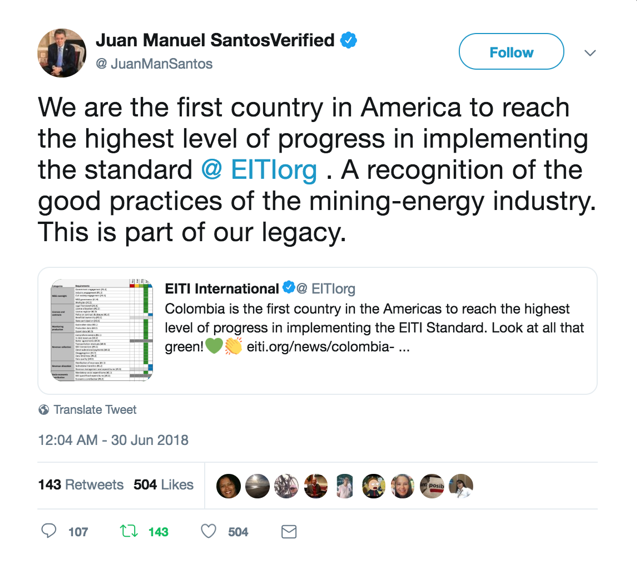
2018 was an eventful year for both the EITI and the wider extractive governance field. The headlines show that our work is as relevant as ever and goes far beyond promoting transparency. From money laundering scandals beleaguering European banks, to Nobel Peace Prize Laureate Dr. Denis Mukwege’s call for better mineral supply chain due diligence – citizens are demanding more transparency and accountability. In the words of Norway’s Minister of International Development Nikolai Astrup “Our own history has shown what is possible when resources are used to the benefit of a country’s citizens. Openness and accountability and democratic oversight have been critical to our success.”
Trust is also a critical component for success. In an age of growing political polarisation, the EITI’s multi-stakeholder, data-driven reform approach is seen to build trust and common understanding. Colombia has notably used the process as a tool to build trust in a post-conflict environment. Our followers were interested to find out more about how that might happen when Colombia became the first Latin American EITI country to achieve the highest level of progress against the EITI standard in 2018.
Former President of Colombia and Nobel peace prize winner Juan Manual Santos tweeted the news.
Senegal was also in the limelight when it achieved a strong Validation result this year. A string of major oil and gas discoveries off its coast are expected to make the West African nation an oil exporter in coming years. The Senegalese government has shown commitment to transparency and good governance, and co-hosted the EITI’s first conference in Africa on beneficial ownership disclosure in October. President Macky Sall opened the conference by calling on all African states to tackle hidden ownership as a way of reducing the significant illicit financial flowing out of the continent.
Other popular posts ranged widely, focusing on different EITI priority areas to tackle hidden ownership, corruption and improve management in the extractives. EITI countries raced ahead with new commitments, laws and registers. Such initiatives for good governance have ripple effects. Notably, the EITI’s supporting companies signed up to a set of expectations in 2018 to enhance their commitment to greater transparency. In the aftermath, Rio Tinto, Kosmos, ICMM and Total made public declarations in support of contract transparency in the countries they operate in. EITI Chair Fredrik Reinfeldt lauded such initiatives as he called on governments to match companies’ policies and publish contracts.
Finally, our piece on reporting, not reports garnered much attention, outlining how EITI countries will increasingly disclose information online, in open data formats. More and more, EITI data can be used in conjunction with other data sets, enabling powerful and sophisticated analysis to be conducted and, consequently, allowing citizens to gain more knowledge about who is operating in their sector, how much they are making and under what terms at the project level.
If you want to keep up to date on the emerging trends and key issues in natural resource governance, join the 10,000 who have already signed up for our newsletter by clicking here and get all our latest stories right in your inbox every month.
Связанные материалы






